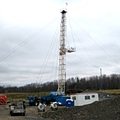- By Dan Veaner
- News
 Print
Print  The Lansing Town Hall was nearly full Wednesday with residents who wanted to weigh in on a proposed moratorium on heavy industry that is aimed at preventing fracking in the town for a year. 19 residents spoke in favor of the moratorium, with some going further to urge the Town Board to ban fracking outright. One resident spoke against it. All five board members said they strongly favor a moratorium.
The Lansing Town Hall was nearly full Wednesday with residents who wanted to weigh in on a proposed moratorium on heavy industry that is aimed at preventing fracking in the town for a year. 19 residents spoke in favor of the moratorium, with some going further to urge the Town Board to ban fracking outright. One resident spoke against it. All five board members said they strongly favor a moratorium."It always amazes me that economics trumps health," said Lansing Supervisor Kathy Miller. "And that's basically what this is. We're really not sure about the health consequences of fracking. The CDC is doing studies that they've started in Texas, and I think they are at the most five years old. We all know that it takes them 20 years to finish their studies."
The proposed moratorium is designed to keep hydrofracking at bay for at least a year in Lansing while permanent solutions are put in place to protect the Town from potential adverse outcomes. While town officials do not believe they can complete all the work needed, especially environmental studies, within a year, Town Attorney Guy Krogh has advised the board that a one year moratorium is most likely to be defensible in court, and that if a good faith effort is made to complete the work in that time the moratorium could be extended.
Resident Jeremy Dietrich cautioned that the town will not be able to prove the cause of damage to roads or its environment unless baseline studies showing their condition are completed before drilling is licensed in the town. One resident argued that people will flock to Lansing from towns in Pennsylvania and Texas where fracking has impacted the environment. Resident Frank Barry said he would likely move away from lansing if drilling is permitted. Resident Sarah Thompson argued that hydrofracking will hurt the things that attract visitors to Lansing.
"It seems like Lansing is coming into its own as a destination," she said. "We're just starting to see the benefits of what we can achieve here in Tompkins County. I think we have a lot to offer and we have a lot to save. We should try to make the best and more of what we already have rather than succumb to what other people may see for us."
Deputy Supervisor Robert Cree said that he is scared by the prospect of fracking, and worries that Lansing could become liable to neighboring communities if drilling in the town had unintended consequences affecting Cayuga Lake.
"Given the proximity of Lansing to Cayuga Lake, we really have to think not only about our community, but about communities around the lake," he said. "In the event that anything comes from underground and flows into that lake we could potentially be responsible for other towns and their health and well being."
Councilwoman Ruth Hopkins concurred with Miller's fears about health hazards. Councilwoman Andra Benson, an organic dairy farmer, said that she is 100% against hydrofracking.
"They haven't convinced me that they're not going to pollute our water," she said. "If homeowners and landowners wells are polluted, the gas companies said, 'Well, we'll buy bottled water.' Nobody's going to buy bottled water for our 600 cows. Then that's the end of our farming."
Benson accused Governor Andrew Cuomo of linking hydrofracking to his political aspirations. Councilman Ed LaVigne also accused Albany legislators with meddling, saying that home rule should determine what happens in local municipalities. LaVigne, a pharmacist, reminded the assembly of the unintended consequences of cyclamates and thalidomide.
"We humans are very blessed because we put people on the moon, we give people new sets of eyes, we teach bacteria how to make insulin, we give you new hearts -- it gives us an air of arrogance," he said. "Ask the people in Alaska how that Valdiz is doing. Oops! Ask the people in Love Canal how that's going or in Cleveland when their river is on fire. Pharmacists have a creed that says if the risk is outweighed by the benefit then you do it. My opinion is that the risk is way to high for the benefit right now."
LaVigne and Miller cautioned that passing a moratorium is only the first step. Miller encouraged those present to help do the work that needs to be done to protect the town from the possible consequences of hydrofracking. That will include updating Lansing's comprehensive plan and land use ordinance, a study of aquifers and natural areas, and roads.
"We are going to need your help to do that," Miller said. "This is a long list of things. It's wonderful that you came out, but when there is a call to join one of these groups, find it and find the time and energy to join. We can extend the moratorium if we don't get all of this done (within a year), but we can't extend it unless we accomplish something."
Final language on the moratorium law is being drafted, and Miller said the Board will vote on whether to pass it into law at its May 16th meeting.
v8i17



